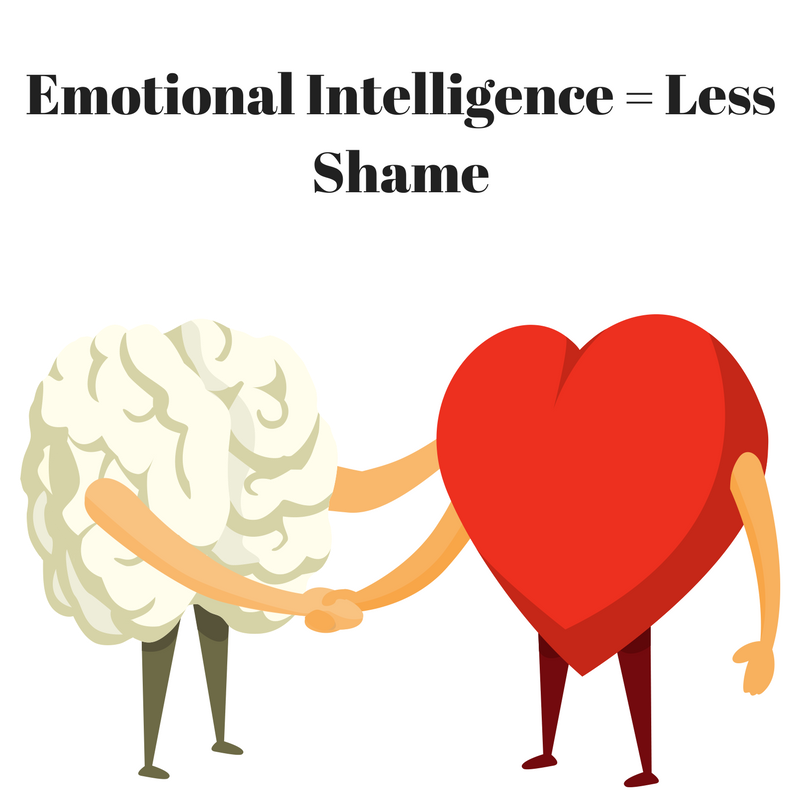Like what you read? Share this post on social media. Emotional intelligence means that a person is good at noticing and identifying their emotions, such as “I’m feeling proud.” They’re also able to sort through and separate out a whole bunch of emotions, even when they’re all going off at the same time, such as “I’m feeling angry because I feel insulted. But I also feel insecure because some small part of me realizes that there was something true about your criticism and so maybe I deserved it. If I deserved it, that makes me feel like I’m a bad person and that makes me ashamed of myself…which is so painful that I push it away by focusing on my anger towards you.” Being able to sort through a big pile of emotions can be very helpful. Another aspect of being intellectually aware of your emotions is that you gain the ability to separate your thoughts from your feelings. You’re able to slow down and think. Having some space between you and your feelings calms you down. That distance allows you to investigate your feelings. This investigation allows you to get a better understanding of what your emotions are trying to tell you. If you can notice, “I’m suddenly feeling so anxious.” Then you can ask yourself, “What’s going on?” and listen for the answers. Maybe the answer is, “I’m anxious because I’m afraid that I won’t do as well as the others and they’ll think less of me and then I’ll start to feel bad about myself and get depressed.” Being able to think, unemotionally, about your emotions helps you see the connection between current feelings and old wounds of the past. You can think, “When have I felt this way before?” You can remind yourself, “This situation is different, it just reminds me of the past.” You can look for reminders to bring you back into the present moment, “I’m not being criticized by my father. I’m getting suggestions from my boss.” Unless you’re able to identify when your old wounds have been triggered, you could feel like every experience is a repeat of the past. You will ride an emotional roller coaster when you aren’t able to stop and think about the feelings that are flooding you. There’s no time to think straight. It’s all feeling and no thought. You could lose the power to choose consciously how you’d like to react. Instead, you react impulsively by hitting, yelling, insulting, or quitting. Your emotions have pushed you around. Reducing you to your most primal, basic form of functioning. When you act out of your primal nature you’re at risk of behaving in ways that you might regret. That regret turns into shame. And shame is one of the most painful feelings to experience. Emotional intelligence gives you the tools to manage your emotions from your higher level, cognitive functioning. When you’re brain gets to call the shots, you’ll choose to react in ways that you’d be proud of. You may be someone who has difficulty naming their emotions. Or you’re emotional vocabulary is very advanced. Wherever you’re at, there’s always room to grow. Every relationship, every experience provides an opportunity for you to learn about yourself. Developing your emotional intelligence will give you the power to choose how you want to feel and how you want to react. Additionally, you will get to know yourself better as you discover the rich and unique inner world that lives inside of you. Schedule a free 15 minute consultation by calling +1 (818) 245-5298
Rena Pollak, LMFT, CGP | 15720 Ventura Blvd., Ste. 508, Encino, CA 91436 | 818-245-5298 Have you ever seen the phrase “Emotional Intelligence” and wondered what it meant? “Academic intelligence” means being able to learn and understand academic material like math, science, or languages. Someone who’s “smart with their hands” has an aptitude for working with their hands; making things and fixing things. So what does “emotional intelligence” mean? And how can emotional intelligence protect you from shame?
Have you ever seen the phrase “Emotional Intelligence” and wondered what it meant? “Academic intelligence” means being able to learn and understand academic material like math, science, or languages. Someone who’s “smart with their hands” has an aptitude for working with their hands; making things and fixing things. So what does “emotional intelligence” mean? And how can emotional intelligence protect you from shame?What is Emotional Intelligence?
Emotional Intelligence Helps You Stop Repeating the Past
Emotional Intelligence Can Protect You From Shame
Everyone Can Improve Their Emotional Intelligence
Let’s Talk
or e-mailing me at Therapy@RenaPollak.com
